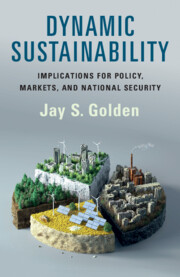
- Publisher:
- Cambridge University Press
- Online publication date:
- December 2023
- Print publication year:
- 2023
- Online ISBN:
- 9781009298711


This book provides new insights into the opportunities, risks, and unintended consequences for the American economy, legacy industries, global multinational corporations, and financial institutions having pledged to transition to a net-zero carbon economy. It places specific emphasis on 'systems analysis', as well as the unprecedented pace needed for our sustainability transition. It examines the implications of organizations purchasing voluntary carbon credits which are not regulated, insured, and often not scientifically validated. It scrutinises how financial markets are driving corporate sustainability while at the same time conservative policymakers seek to ban Environmental Social Governance investments. Golden discusses national security as well as the growing rural-urban divide, seemingly widened by major automotive manufacturers looking to move towards zero-emission electric vehicles. Using empirical evidence to chart the effect of our sustainability transition on the government, the military, and corporations, this book is an invaluable resource for researchers, graduate students, policymakers, and industry professionals.
‘Professor Golden’s book should be read by every early-career believer who wants to become a sustainability leader, as well as every mid- or late-career professional who is expected to be one. All of society is or will be on this journey; don’t set off without reading this book.’
Francis Bouchard - Managing Director, Climate, Marsh McLennan
‘Organizational pledges to net zero carbon emissions without taking action are empty promises. Golden provides a compelling and insightful analysis of the many policy implications, digital requirements, and new technology roadmaps that will be required for the American economy to truly move towards a net-zero carbon ecosystem. He provides some important implications for long-term and short-term actions that senior executives, government policy makers, and academics should consider as we move into the next decade.’
Rob Handfield - Executive Director of Supply Chain Resource Cooperative and Bank of America University Distinguished Professor of Operations and Supply Chain Management, North Carolina State University
‘The world is transitioning out of necessity to electricity and clean, renewable energy and storage across all energy sectors. What are the implications of such a technology transition on society, policies, markets, and national security? This well-crafted book answers these questions with a plethora of facts woven into an engaging narrative. I strongly recommend it.’
Mark Z. Jacobson - Stanford University; author of No Miracles Needed: How Today's Technology Can Save Our Climate and Clean Our Air
 Loading metrics...
Loading metrics...
* Views captured on Cambridge Core between #date#. This data will be updated every 24 hours.
Usage data cannot currently be displayed.